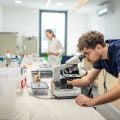
Credit: Shutterstock
Major academic-industry collaboration to tackle global challenges in sustainability
The University of Oxford joins a major new collaboration with academia and industry to use sustainable chemical technologies to accelerate the UK’s transition to net zero carbon emissions.
The Innovation Centre for Applied Sustainable Technologies (iCAST) is a unique £17m facility hosted by the Centre for Sustainable and Circular Technologies (CSCT) that will accelerate the translation of sustainable chemical technology research to help tackle the global challenges of the climate emergency, sustainable development and plastics pollution.
It brings together industry with expertise at the Universities of Bath and Oxford, the High Value Manufacturing Catapult’s Sustainability Partnership (National Composites Centre and Centre for Process Innovation), innovation experts at SETsquared, Local Enterprise Partnerships and investors.
iCAST brings together a range of experts to tackle the problem of improving sustainability in the production of chemicals, polymers and materials
Professor Charlotte Williams OBE, at the Department of Chemistry, University of Oxford and co-director of the centre, said: ‘iCAST brings together a range of experts to tackle the high-profile problem of improving sustainability in the production of chemicals, polymers and materials.
'The centre will support a wide range of academic-commercial partnerships with the over-arching goal of developing technologies that transform sustainable raw materials into useful products which are designed from the outset for re-use, recycling and disassembly.
‘Through working closely with businesses, and strongly supported by Swindon and Wiltshire local enterprise partnership, we aim to make the South West UK a focal point for sustainable manufacturing and products.’
The centre will provide significant new resource to support the translation of outcomes from Oxford experts working in sustainability.
iCAST will focus on research into four core programmes: bio-based feedstocks; sustainable chemical production systems; sustainable engineering materials and plastics as part of a circular economy. It is supported by the Research England Development Fund, an initiative from UKRI that drives innovation in research and knowledge exchange in higher education.
By partnering companies with the critical mass of research expertise at Bath and at Oxford, iCAST will accelerate scaleup of new technologies, deliver economic impact, and build supply chains, jobs and growth in the UK
The partnership has over 45 member companies ranging from spin-outs, high growth SMEs and multinational corporates. Companies include Unilever, Wessex Water, Total, Corbion and Recycling Technologies.
Professor Matthew Davidson, Whorrod Professor of Sustainable Chemical Technologies at the University of Bath, is co-director of iCAST. He said: ‘By partnering companies with the critical mass of research expertise at Bath and at Oxford, iCAST will accelerate scaleup of new technologies, deliver economic impact, and build supply chains, jobs and growth in the UK.
‘This funding from UKRI will enable iCAST to achieve sustainability and become established as the ‘go to’ place in the UK for innovation in sustainable technologies.’
Paddy Bradley, Swindon and Wiltshire Local Enterprise Partnership CEO said of the project: ‘This is truly an exciting collaboration and couldn’t come at a more crucial time.
‘The Innovation Centre for Applied Sustainable Technologies (iCAST) is a significant step forward in reaching the goal of not only changing the way the world thinks but also how we behave to prevent further damage to our natural environment.
‘We need business, academia and technology to harmonise as we advance towards a genuinely circular economy and iCAST is a partnership opportunity allowing us to meet today’s challenges.’
Read more about iCAST.
Read about Professor Charlotte Williams’s work on the Future of Plastics Programme at the Oxford Martin School.
Read about Professor Charlotte Williams at the Department of Chemistry.
 New Oxford-led initiative launches to train future leaders in transformative technologies for pharmaceutical research
New Oxford-led initiative launches to train future leaders in transformative technologies for pharmaceutical research